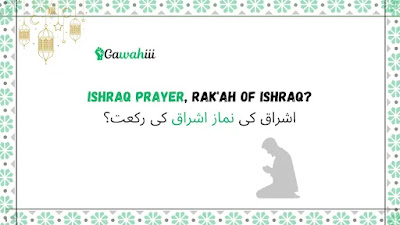ishraq prayer?
After finishing the Sunnah Fajr prayer, engage in remembrance of Allah until Ishraq. The highest level in this is to sit where you have performed the obligatory prayers. The average level is to sit anywhere in the mosque.
The lowest level is to leave the mosque but continue to recite the remembrance of Allah with equal voice. When the sun rises (approximately fifteen to twenty minutes after sunrise), pray two rak’ahs of Nawafil, and you will get the reward of a full Hajj and an Umrah. This is called Ishraq Prayer. (Sunan Tirmidhi, Mazahir-e-Haqq)
Virtue: If one prays four rak’ahs of Nawafil at the time of Ishraq, the fire of Hell will not touch his skin. (Sunan Al-Kubra by Al-Bayhaqi)
Morning Breakfast?
The Prophet (peace and blessings of Allaah be upon him) used to drink water mixed with honey. (Sunan Ibn Majah)
Similarly, drinking Nabidh Tamar has also come, that is, breaking the dates and putting them in an earthen vessel at night, and drinking this water in the morning. (Sunan Tirmidhi)
After Ishraq, engage in lawful worldly occupations and activities, then pray Chausht prayer at Chausht time.
chasht prayer time?
When the sun rises and the sun shines brightly, approximately from 8 am to an hour before sunset, two rak’ahs, four rak’ahs, six rak’ahs or eight rak’ahs of Nafl can be prayed. (Sahih Muslim)
Virtue:
1. By praying just two rak’ahs of Chausht, 360 pairs of charity are paid in the human body and all minor sins are forgiven, even if the sins are equal to the foam of the sea. (Sahih Muslim, Sunan Tirmidhi)
2. By performing four rak’ahs of the afternoon prayer, Allah Almighty makes the great tasks of the day easy for the servant. (Musnad Ahmad)
3. Whoever leaves his house with ablution for the afternoon prayer will receive the reward of performing Umrah. (Sunan Abu Dawud)
4. Whoever performs eight rak’ahs of the voluntary prayers at the time of the afternoon prayer will be counted among the worshippers, and if he performs twelve rak’ahs of the voluntary prayers, a palace will be built for him in Paradise. (Musnad Ahmad)
Noon prayer time ?
Note: It is recommended to perform both Tahiyyah al-Wudhu and Tahiyyah al-Masjid at the time of the afternoon prayer.
1. Tahiyyah al-Wudhu: After performing complete ablution, perform two rak’ahs of the voluntary prayers in such a way that thoughts are not brought to mind intentionally, by performing this way, all minor sins are forgiven. (Sunan Tirmidhi)
2. Tahiyat al-Masjid: Whenever you enter the mosque, pray two rak’ahs of voluntary prayer. (Sunan Tirmidhi)
There are four rak’ahs before the obligatory prayers of Zuhr and two rak’ahs after the obligatory prayers. If the congregation stands up, do not rush to come, but come calmly and with dignity. (Sunan Tirmidhi)
Prayer Manners:?
1. Those who are most familiar with the issues of prayer should stand behind the Imam. (Sunan Tirmidhi)
2. It is proven from the Holy Prophet (peace and blessings of Allah be upon him) to pray on a carpet, mat, or the ground. Praying on the ground is better than a mat, and on a mat is better than a cloth prayer mat. (Sharh al-Niqa’ah)
After the Zuhr prayer, get busy with your own activities and take special care of the Asr prayer. The Holy Quran specifically commands to pray the Asr prayer in congregation.watch
sunnah related asr prayer time ?
It is Sunnah to pray four rak’ahs of Nafl prayer before the obligatory prayers of Asr. (Sunan Tirmidhi)
1. When the congregation is standing, arrange to keep the rows straight.
2. If the other person or the Imam asks to move forward and backward, then do so.
3. Perform each prayer as if it were my last prayer.
4. Like the Fajr prayer, remember Allah for a while after the Asr prayer. At this time, the duties of the appointed angels of the day and night change. Often, Subhan Allah is recited 33 times, Alhamdulillah 33 times and Allahu Akbar 34 times, then supplication is made. (Sahih Bukhari)
اشراق کی نماز
سنت فجر کی نماز سے فارغ ہو کر اشراق تک ذکر الہی میں مشغول رہیں۔ اس میں اعلیٰ درجہ یہ ہے کہ جس جگہ فرض پڑھے ہیں وہیں بیٹھے رہیں۔ اوسط درجہ یہ ہے کہ اس مسجد میں کسی بھی جگہ بیٹھ جائیں۔
ادنیٰ درجہ یہ ہے کہ مسجد سے باہر چلے جائیں لیکن ذکر الہی برابر زبان سے ادا کرتے رہیں۔ جب آفتاب نکلنے کے بعد اس میں چمک آجائے (تقریباً آفتاب نکلنے کے پندرہ بیس منٹ بعد) تو دو رکعت نفل پڑھیں تو پورے ایک حج اور ایک عمرے کا ثواب ملتا ہے۔ اس کو نماز اشراق کہا جاتا ہے۔ (سنن ترمذی، مظاہرِ حق)
فضیلت: اشراق کے وقت چار رکعت نفل پڑھے تو اس کی کھال کو دوزخ کی آگ نہ چھوئے گی۔ (السنن الکبریٰ للبیہقی)
صبح کا ناشتہ
نبی کریم صلی اللہ علیہ وسلم شہد میں پانی ملا کر پیا کرتے تھے۔ (سنن ابن ماجہ)
اسی طرح نبیذ تمر پینا بھی آیا ہے، یعنی چھوہارے توڑ کر رات کو مٹی کے برتن میں ڈال کر رکھا جائے، اور صبح اس پانی کو پیا جائے۔ (سنن ترمذی)
چاشت کی نماز
اشراق کے بعد حلال روزگار و مشاغل دنیوی میں مشغول ہو جائیں، پھر چاشت کے وقت چاشت کی نماز پڑھیں۔
چاشت کا وقت
جب سورج بلند ہو جائے اور دھوپ میں تیزی آجائے، اندازاً صبح 8 بجے کے بعد سے زوال سے ایک گھنٹہ قبل تک دو رکعت، چار رکعت، چھ رکعت یا آٹھ رکعت نفل پڑھی جا سکتی ہیں۔ (صحیح مسلم)
فضیلت:
1. چاشت کی صرف دو رکعت پڑھنے سے انسان کے بدن میں 360 جوڑوں کا صدقہ ادا ہو جاتا ہے اور تمام صغیرہ گناہوں کی مغفرت ہو جاتی ہے، چاہے گناہ سمندر کی جھاگ کے برابر ہوں۔ (صحیح مسلم، سنن ترمذی)
2. چاشت کی چار رکعت پڑھنے سے اللہ تعالیٰ دن بھر کے بڑے بڑے کام اس بندے کے بآسانی پورے کراتے ہیں۔ (مسند احمد)
3. جو شخص چاشت کی نماز کے لیے باوضو ہو کر گھر سے نکلے تو اسے عمرے کا ثواب ملتا ہے۔ (سنن ابوداؤد)
4. جو شخص چاشت کے وقت آٹھ رکعت نفل پڑھے تو اس کا شمار عابدین (عبادت گزاروں) میں ہو گا، اور اگر بارہ رکعت نفل پڑھے تو جنت میں ایک محل بنا دیا جائے گا۔ (مسند احمد)
ظہر کی نماز سے متعلق سنتیں
نوٹ: تحیۃ الوضو اور تحیۃ المسجد، دونوں کا ظہر کے وقت پڑھنا مستحب ہے۔
1. تحیۃ الوضو: کامل وضو کرنے کے بعد دو رکعت نفل اس طرح پڑھیں کہ خیالات کو جان بوجھ کر نہ لائیں، اس طرح پڑھنے سے تمام صغیرہ گناہ معاف ہو جاتے ہیں۔ (سنن ترمذی)
2. تحیۃ المسجد: جب بھی مسجد میں داخل ہوں، دو رکعت نفل نماز پڑھیں۔ (سنن ترمذی)
ظہر کے فرضوں سے پہلے چار رکعت اور فرضوں کے بعد دو رکعت سنتیں ہیں۔ اگر جماعت کھڑی ہو جائے تو دوڑ کر نہ آئیں بلکہ سکون اور وقار کے ساتھ آئیں۔ (سنن ترمذی)
نماز کے آداب:
1. امام کے پیچھے وہ لوگ کھڑے ہوں جو نماز کے مسائل سے زیادہ واقف ہوں۔ (سنن ترمذی)
2. نبی کریم صلی اللہ علیہ وسلم سے فرش، چٹائی اور زمین پر نماز پڑھنا ثابت ہے۔ زمین پر نماز پڑھنا چٹائی سے افضل ہے اور چٹائی پر کپڑے کے مصلیٰ سے بہتر ہے۔ (شرح نقایہ)
ظہر کی نماز کے بعد اپنی مصروفیات میں مشغول ہو جائیں اور عصر کی نماز کا خاص خیال رکھیں۔ قرآن کریم میں خاص طور پر عصر کی نماز باجماعت ادا کرنے کا حکم آیا ہے۔
نماز عصر سے متعلق سنتیں
عصر کے فرضوں سے پہلے چار رکعت نفل پڑھنا سنت ہے۔ (سنن ترمذی)
1. جب جماعت کھڑی ہو تو صفیں سیدھی رکھنے کا اہتمام کریں۔
2. دوسرا آدمی یا امام اگر آگے پیچھے ہونے کو کہے تو عمل کریں۔
3. ہر نماز کو ایسے ادا کریں جیسے یہ میری آخری نماز ہو۔
4. فجر کی نماز کی طرح عصر کی نماز کے بعد بھی کچھ دیر ذکر الہی کریں۔ اس وقت دن اور رات کے مقررہ فرشتوں کی ڈیوٹی بدلتی ہے۔ اکثر 33 مرتبہ سبحان اللہ، 33 مرتبہ الحمد للہ اور 34 مرتبہ اللہ اکبر پڑھا جاتا ہے، پھر دعا کی جاتی ہے۔ (صحیح بخاری)

